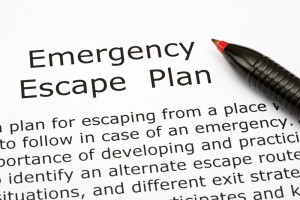 As fires and floods become more common across the country, the likelihood increases that at one time or another, homeowners and their families may have to evacuate their homes for safety reasons. Not only are these natural disasters becoming more frequent, but other weather catastrophes such as hurricanes and tornadoes may also force families to leave their homes for a local shelter or other safe haven. However, studies show that most average American families do not have an evacuation plan in place.
As fires and floods become more common across the country, the likelihood increases that at one time or another, homeowners and their families may have to evacuate their homes for safety reasons. Not only are these natural disasters becoming more frequent, but other weather catastrophes such as hurricanes and tornadoes may also force families to leave their homes for a local shelter or other safe haven. However, studies show that most average American families do not have an evacuation plan in place.
The Federal Emergency Management Association (FEMA) advises, “In some circumstances, local officials decide that the hazards are serious and require mandatory evacuations. In others, evacuations are advised or households decide to evacuate to avoid situations they believe are potentially dangerous. When community evacuations become necessary, local officials provide information to the public through the media. In some circumstances, other warning methods, such as sirens, text alerts, e-mails, or telephone calls are used. The amount of time you have to leave will depend on the hazard. If the event is a weather condition, such as a hurricane, you might have a day or two to get ready. However, many disasters allow no time for people to gather even the most basic necessities, which is why planning ahead is essential.”
In order to plan ahead, homeowners and their families must have some sort of evacuation plan. To create this plan, they should sit down with their family and discuss the possible dangers that come with living in the geographic area that they do, but do so calmly. They should explain the circumstances under which they may have to evacuate and that having a plan is the best way for everyone to remain safe if anything should happen. Homeowners who have young children and who are worried about frightening them should simply explain about having a “safety plan” instead of describing all of the situations that might call for one. This will not only keep them from being frightened, but also make the concept of evacuation easy to understand as well.
In order to formulate a plan, homeowners should make an agreement with their families where to meet in case of a disaster, agree when to leave, and they should in particular have an alternate plan of evacuation in case their main escape route becomes blocked by bad weather or traffic. If the entire family is aware of the plan and understands what to do when disaster strikes, they have a better chance of survival and escape.

Zach Jefferson
Author – Zach has six years under his belt as a marketing manager within the home security industry. He is in charge of keeping site information as accurate as possible, while developing new content ideas for consumers.

